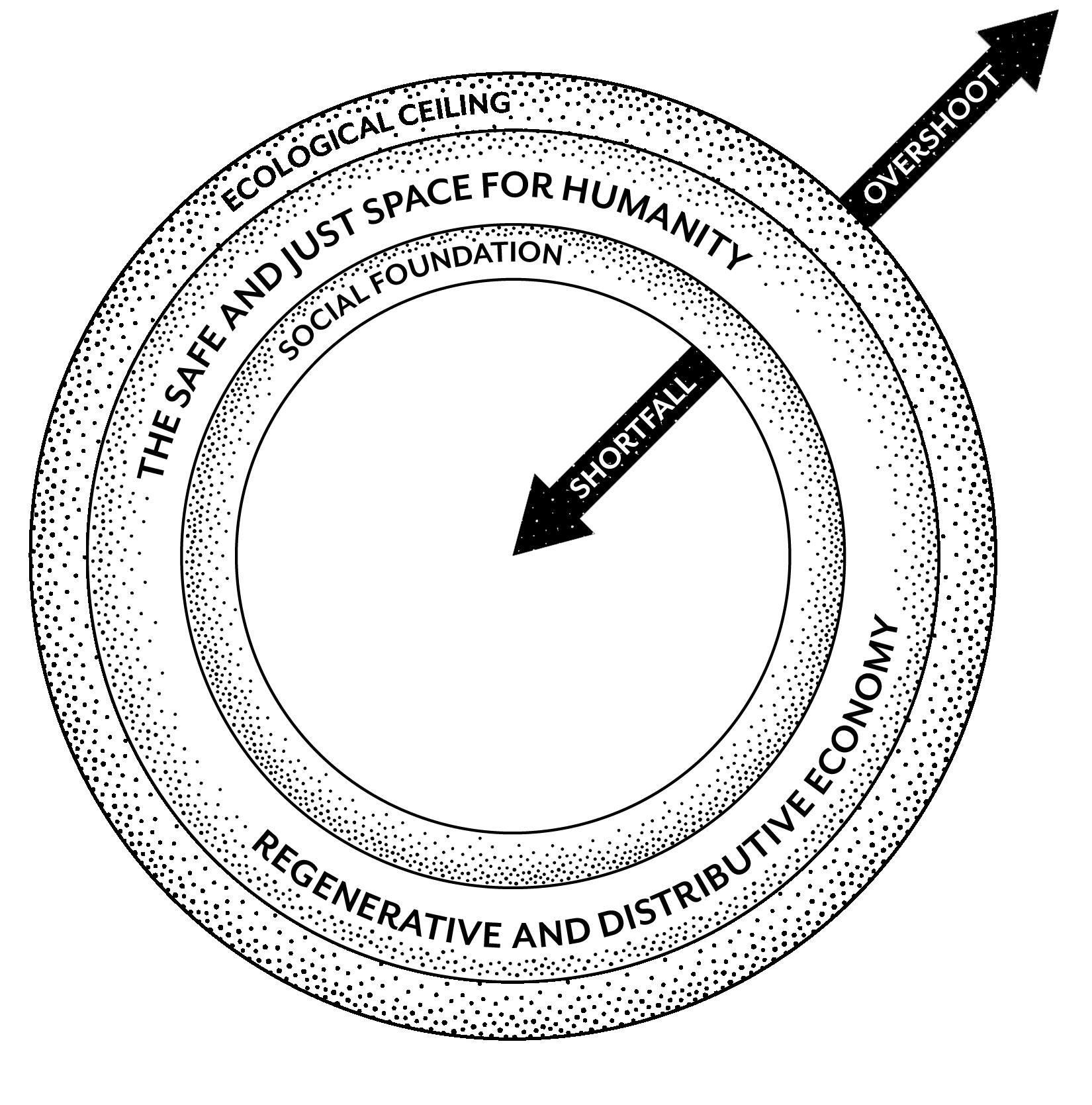
7 minute read
Social Entrepreneurship & Corporate Social Responsibility
pg. 19
Decolonizing Social
Advertisement
BENJAMIN DANIELS
Within the reality of a capitalistic society founded on colonialism, how do we begin to decolonize and implement sustainable practice? New modes of interpreting responsible enterprise are a start, but in order to more fully ideate where we can go, we must first acknowledge the past and hold ourselves accountable to a more ethical future.
First, it is important to differentiate the definitions of social entrepreneurship and corporate social responsibility. Social entrepreneurship as a well-known business practice was mainstreamed by Nobel laureate Muhammad Yunus, the founder of Grameen Bank. The bank provided Bangladeshi citizens of low socioeconomic status with microloans to help provide small amounts of capital that could go a long way for local entrepreneurs.The microloan model worked, providing a way out of poverty for poor citizens and creating a system where loan repayment was extraordinarily high. Yunus showed that it was possible for a for-profit entity to both make money and give back to society. Social entrepreneurship became a more visible field, and is now defined as using private sector approaches to combat social and environmental issues.
As for corporate social responsibility (CSR), the historical roots of this practice extend back to the 1950s, as society grappled with the immense power of corporations, and whether they were obligated to give back to their communities. Howard Bowen, considered the father of CSR,
Muhammad Yunus
pg. 20
pg. 21 Social Entrepreneurship & Corporate Social Responsibility
wrote the book The Social Responsibilities of the Businessman, published in 1953, in which he defined CSR as, “the obligations of businessmen to...make those decisions...that are desirable in terms of the objectives and values of our society.” Today the definition has become, “a self-regulating business model that helps a company be socially accountable—to itself, its stakeholders, and the public.” Many social enterprises now attempt to practice CSR by expanding from pursuing the singular bottom line of profit, to what is called the “triple bottom line” —a company’s duty to generate profit, but also meet their obligation to the planet and to people.
Social entrepreneurship and CSR work to utilize market forces within capitalism for good. However, a truly ethical approach to the field of business must examine the foundations upon which it was built, even if they are unflattering. Modern day capitalism is inextricably linked to colonization, both in terms of an enduring legacy of exploitation used to make profit, and in regards to wealth gaps proliferated through discriminatory practices against marginalized communities.
Colonial Background
Colonization was marked by the brutal oppression and exploitation of humans — often people of color— in order to open new markets and create material profit for colonizers. For example, the violent displacement of Indigenous people made it possible for colonizers to seize land, which they quickly privatized in order to create a real estate market. The enslavement of Black people in the United States was a way to generate wealth quickly through free labor. Today, capitalism continues to be influenced by colonial beginnings, with white Americans being the most likely to have inherited wealth and capital to invest or start businesses, and the most likely to own land and real estate. Additionally, large corporations that generate massive amounts of wealth almost always do so through the exploitation of humans, often in the Global South, or through other forms of cheap labor, such as through immigrants or prison labor. Samir Amin, an Egyptian economist, argues that colonialism and capitalism “are inseparable.”
Social Entrepreneurship & Corporate Social Responsibility pg. 22
He states,
“Capitalism has been colonial, more precisely imperialist, during all the most notable periods of its development. The conquest of the Americas by the Spaniards and Portuguese in the 16th century, then by the French and the British, was the first modern form of imperialism and colonization: an extremely brutal form which resulted in the genocide of the Indians of North America, Indian societies in Latin America thrown into slavery and black slavery through the whole continent, north and south. Beyond this example, by following a logic of precise deployment through the different stages of its history, we can see that capitalism has constructed a consistent dichotomy of relations between a centre (the heart of the system of capitalist exploitation) and the periphery (made up of dominated countries and peoples).”
A jarring example is the development of Trans-National Corporations (TNCs) that have exploited the Niger Delta region without regard for social good or the environment. Through oil production, TNCs have had destructive effects, including the loss of agriculture, damage to fishing and other
pg. 23


Social Entrepreneurship & Corporate Social Responsibility pg. 24
local industries, and causing detrimental harm to already impoverished communities. In addition, because of the quick profits of oil production, TNCs have failed to invest in the development of better technologies that could lead to renewable energy sources, cleaner water, better local supply chains, and more employment opportunities for local communities. The insatiable appetite for unlimited growth among large corporations like TNCs is undeniably reminiscent of colonization and its willingness to exploit and destroy in exchange for material gain.
Examples of Decolonization
It is plain to see that the field of social entrepreneurship and CSR has a long way to go in unraveling the private sector from unethical practices with roots in colonialism. Not only do these practices need to give back to communities, but they must find a way to fundamentally lead business towards a mode that does not exploit. First steps might include giving opportunity to underrepresented communities, by promoting individuals of color and women to positions of leadership, and listening to their opinions. Traditional organizational structures might also need to change to better emphasize community rather than hierarchy, and sustainability rather than unlimited growth. Fortunately some entrepreneurs are leading out in new ways of engaging in business practice that more closely resemble decolonized ideals. Here are a few highlights:
Uptima Entrepreneur Collective (https:// uptimacoop.com) was founded by Rani Langer-Croager, an immigrant and woman of color. After personally experiencing and observing the difficulty underrepresented entrepreneurs can face when it comes to business support, Langer-Croager was inspired to found a collective that focused on providing a space where long-term resources and pathways to success could be provided. Uptima Entrepreneur Collective provides “ holistic and culturally relevant

pg. 25 Social Entrepreneurship & Corporate Social Responsibility
education, advising, and community to support diverse entrepreneurs in creating thriving businesses in service to their communities.” Uptima is made of an almost entirely nonwhite staff, focuses on leading businesses to improve their local communities, and has helped over 700 diverse entrepreneurs.
Raven Indigenous Capital Partners
(https://ravencapitalpartners.ca), located in Canada, is an Indigenous-owned consulting company dedicated to impact investing - the practice of making investments that have positive social or environmental impacts in addition to financial returns. This firm seeks to invest in Indigenous business in order to bridge the gap between access to traditional forms of capital and Indigenous entrepreneurs who are often excluded and marginalized, while strengthening Indigenous economies. They state, “we operate from the perspective of the Indigenous world view. We follow traditional Indigenous protocols, we work for the well being of people and the planet, and we acknowledge our responsibility to the next seven generations.”
Conclusion
So, where can we go from here? How do we move entrepreneurship and business beyond exploitative practices stemmed from colonialism? As long as our current systems of oppression that have long upheld corporations remain the same, social entrepreneurship and CSR will be in danger of remaining colonial. Society must be imaginative in pioneering new ways of reconciling with a pervasive system of capitalistic markets and global trade, while also decolonizing in support of a healthy planet and happy people. The economist Kate Raworth presents us with one such imaginative example with her proposal of the “Doughnut,” an economic framework where profit goals stay within the ethical space of meeting human needs while not exceeding the level of production that Earth can ecologically sustain. Some may balk at the idea of advocating for companies to reject goals of unlimited growth - but radical rejection of old colonial methods in exchange for the embracing of new decolonial practices might be just what the world needs.
Social Entrepreneurship & Corporate Social Responsibility pg. 26









